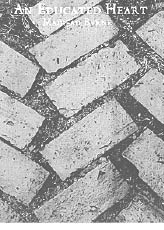An Educated Heart by Mairéad Byrne
by Rosa Alcalá

Can we separate world events from more intimate affairs? The language of mass-media from poetry? In her chapbook An Educated Heart, Mairéad Byrne puts into dialogue the 2003 invasion of Iraq—as experienced through the mediation of headlines and news stories—and the pain of personal difficulties, as these infiltrate our language and everyday actions.
Exploring the language of media by cutting it up, the first three poems, “Baghdad,” “Trapped” and “Rubble,” have the effect of physically pushing the reader slowly, inch by inch, toward the center of the city, to see in the “blood-soaked children’s slippers” the aftermath of military destruction, and to feel the weight of a people’s suffering, of an infrastructure in ruin. In these collage poems, it is as if Byrne is piecing together this place, these people, so that we see through the newspeak that often serves to disguise the brutal consequences of the invasion.
Continuing this exploration in “Metaphor, Similes,” also a collage poem, Byrne shows us how the media aestheticizes its language not to make poetry but to “spin” or soften reality, to “tell it slant”: “like grapes from the sky/ like small grapefruit/ metal butterflies…like a doll in a funeral shroud/ like heavy wooden furniture being moved in an empty room.”
With the poem “Almost,” which amends headlines in the futile hope that one word could reverse death, Byrne asks if the intervention of language really could change reality: “China Shopping Mall Fire Almost Kills at Least 53.” A litany of similar headlines become almost incantatory, a prayer to acknowledge those who become just a number in the news.
The poem “Choose Your Husband,” with its humorously ironic impasse—“War Activist: You should be shot in the head/ Peace Activist: No. You should be shot in the head”—serves to shift the book from world events to what we normally consider more private territory.
Still, Byrne uses “found” language here, too. For example, in the sequence “BROKEN” each of the six poems begins with a word followed by a series of synonyms. What’s poetic or original about this, you might ask—or about any appropriative writing. It is the message any text can hold for us if we are willing to see it: After a six-page journey through what seems like hundreds of the most draining variations of “Broken”—”Split,” “Smashed,” “Fucked”—one finally arrives, as if by a miracle, at three signposts pointing in another, more encouraging direction: “Individuated. Dawned. Freed.”
Not all the poems are appropriative, but as a whole they explore the tension between despair and possibility. For example, in the anaphoric poem “Tedium,” Byrne alternates a series of daily obligations and worries by punctuating it intermittently with a bright light: “My child whose face is a white petal detaching and fluttering towards me.” If the language of media serves to inject a version of the war into our lives, she suggests, then these intimate relationships become a front from which one can offer resistance as well.
In addition to being a compelling read, this small press edition has a beautiful red cover with a picture of a brick path, and a delicate red thread in its spine, tied between the poems “Broken” and “Split.” I can’t help but think that like the incantation of “Almost,” this thread signals hope (but also a caution, a reminder) for not only Iraq, but also our world(s).
|
Issue Navigation> Issue Index > v6n2: Return to the City of Trees (1/11/07) > An Educated Heart by Mairéad Byrne This Week's Issue • Artvoice Daily • Artvoice TV • Events Calendar • Classifieds |









 Current Issue
Current Issue